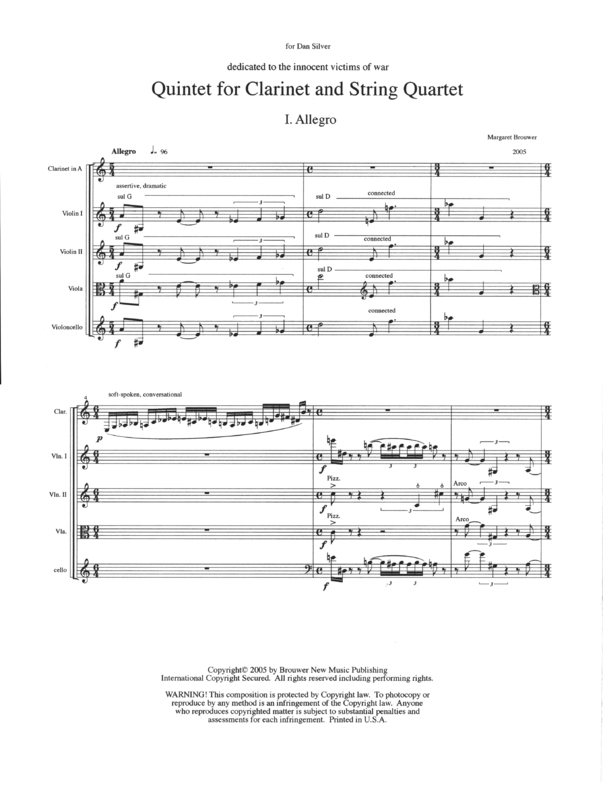Quintet for Clarinet in A and Strings
Item
-
Score title
-
Quintet for Clarinet in A and Strings
-
Composer
-
Margaret Brouwer
-
Program note
-
Quintet for Clarinet in A and String Quartet was commissioned by clarinetist Daniel Silver and the University of Colorado. The Quintet represents new compositional explorations for me using multiple compositional techniques and layering. The catalyst for this was 9/11. I was composing a work at that time which became one of anguish, bewilderment and sadness. There were other emotions I wanted to put into the music, but after a few tries I realized I had no idea how to do it. After more than a year of study and experimentation, including reading self-help books about verbal expression of anger, the first result was a song cycle called Declaration in which the texts and music deal with explosive emotions and sadness. Setting music to these words was a good first step. Composing purely instrumental music presented a greater challenge. But things in the world were bad and getting steadily worse. Frustrated, angry and despairing, I set out to reflect my view of this situation in the clarinet quintet. When I had finished the first two movements, Dan Silver and the Cavani Quartet, in residence together at that time and using the chance to learn these movements, previewed them in an informal concert setting. I knew how the first movement would sound, but when it was actually played I was not satisfied with the style. These wonderful musicians who would premiere the Quintet had learned this very difficult first movement, but agreed to discard it and learn an entirely new movement! For the second effort, the music became a complex expression with many layers, overlaying a 12-tone harmonic plan with tonal sonorities as well as Middle Eastern influences. It is sometimes assertive or aggressive, sometimes passionate, sometimes anguished, with jolts of anger and frustration. It is also a musical experiment to see whether cultures can keep and honor their own special heritage while respecting those of others, and whether the overlaying of different cultural influences can add to and enhance one another. There are short musical quotes: the line 'All men of tender heart, forgiving others…' from the (Christian) hymn, "All Creatures of Our God and King," and the line 'That in our darkened hearts thy grace might shine…' from "All Praise to Thee" mixed and overlaid with a melody that is an imitation of the Muslim "Call to Prayer" - a superficial imitation because the complexities of the rhythmic figures and the melodic fragments were impossible to duplicate. Sometimes these melodic fragments and quotes overlap, or are played simultaneously.
After the mood of the first movement, I was continually drawn for the second movement to a song from my song cycle, Declaration. I had set a poem by David Adams that he wrote after 9/11. The music is very much the same as the original song, but elaborated and expanded for instruments.
An Angel's Song, by David Adams
Whom do you call angel now?
If I am as old as stars,
If I am the speech of God
Find my shadow in the apple boughs.
Find my green wings in the mountains,
My white tears broken in the seas.
For even as you die,
No stalk bends without its angel.
I have heard wailing centuries.
I am waiting in their silences like snow
To dream the music of a single tongue-
One pure leaf in a voiceless wind.
Whom do you call angel now?
Who will teach you how to love?
The third movement, Scherzo, provides a momentary respite from the intensity of the other movements. For the last movement, Moderato, Vivace, I used a strict 12-tone row with no inclusion of other harmonic material - something I had hardly ever done before. The middle section of this movement, though sounding quite different, maintains the row.
Since composing this quintet, I have used a row fairly often, frequently overlaying it with tonal or other harmonies. I love this harmonic complexity.
 Margaret Brouwer
Margaret Brouwer

